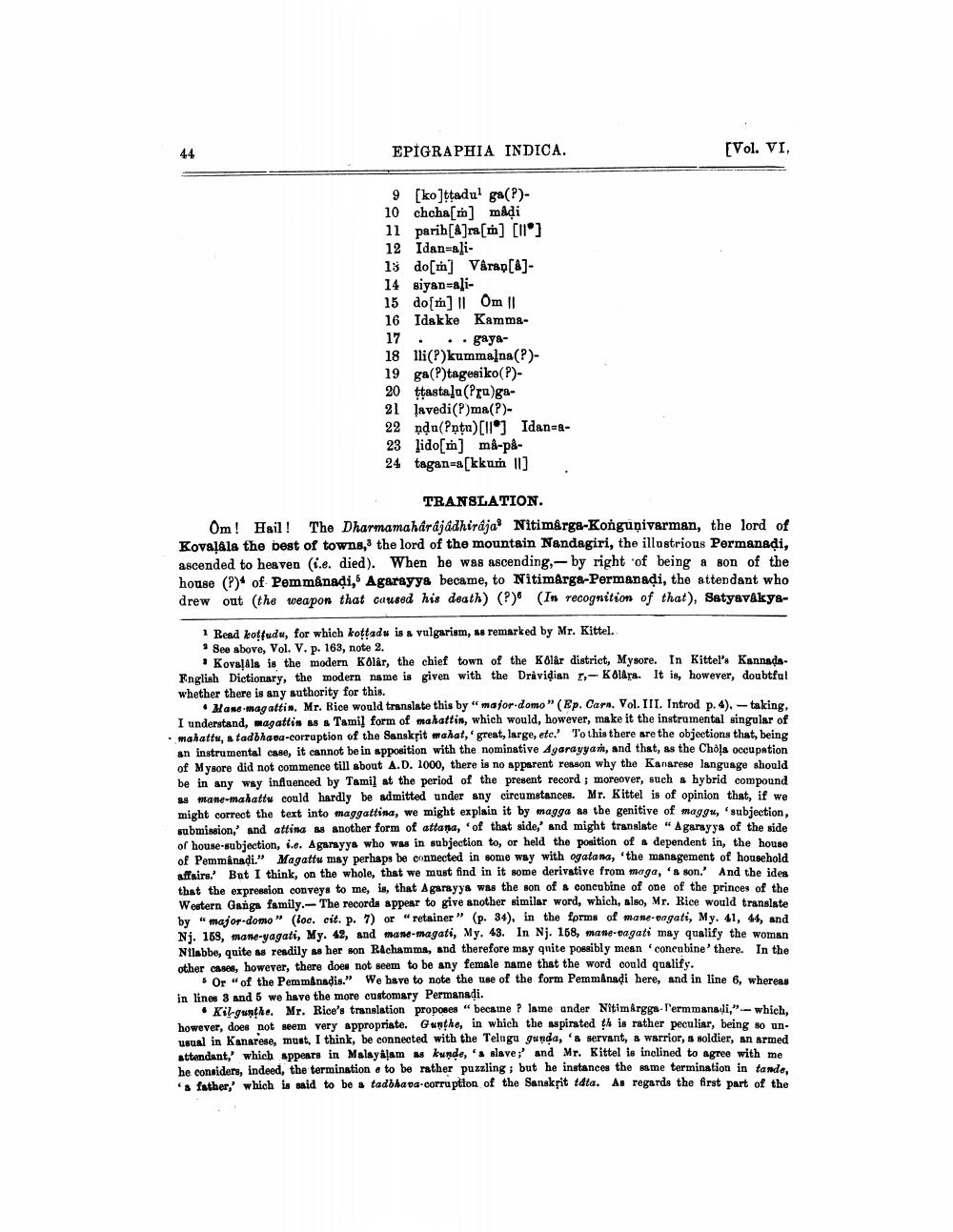________________
EPIGRAPHIA INDICA.
[Vol. VI.
9 [ko]ttadul ga(P)10 chcha[m] mådi 11 parih[&]ra[m] [Ilo] 12 Idan=ali1š do[m] Vâra [a]14 siyan-ali15 do[m] II Om || 16 Idakke Kamma17 . .. gaya18 lli(?)kummalna(?)19 ga(P)tagesiko(?)20 ttastalu (Pru)ga21 svedi(?)ma(?)22 ndu(Pntu) [11] Idan-a23 lido[m] ma-på24 tagan=a[kkum 11]
TRANSLATION Om! Hail! The Dharmamaharajadhiraja Nitimârga-Kongunivarman, the lord of KovaļAls the best of towns, the lord of the mountain Nandagiri, the illustrious Permanadi, ascended to heaven (i.e. died). When he was ascending,- by right of being a son of the house (P)* of Pemmånadi, Agarayye became, to Nitimarga-Permanadi, the attendant who drew out (the weapon that caused his death) (?) (In recognition of that), Satyavákya
1 Read kotfudu, for which kottads is a vulgarism, as remarked by Mr. Kittel. . See above, Vol. V. p. 163, note 2.
• Kovaļals is the modern Kolar, the chief town of the Kolậr district, Mysore. In Kittels Kannada English Dictionary, the modern name is given with the Dravidian 1,- Klára. It is, however, doubtful whether there is any authority for this.
• Mane-mag attir, Mr. Rice would translate this by "major.domo" (Ep. Cars. Vol. III. Introd p. 4). -taking, I understand, magattin as a Tamil form of mahattin, which would, however, make it the instrumental singular of mahattu. tadbhava-corruption of the Sanskrit mahat, 'great, large, ete.' To this there are the objections that, being an instrumental case, it cannot be in apposition with the nominative Agarayyan, and that, as the Chola occupation of Mysore did not commence till about A.D. 1000, there is no apparent reason why the Kanarese language should be in any way influenced by Tamil at the period of the present record ; moreover, such a hybrid compound u mana-mahattu could hardly be admitted under any circumstances. Mr. Kittel is of opinion that, if we might correct the text into maggattina, we might explain it by magga as the genitive of maggu, subjection, submission, and attina m another form of attana, 'of that side, and might translate " Agaray ya of the side of house-subjection, i... Agarayya who was in subjection to, or held the position of a dependent in, the house of Pemmånadi." Magattu may perhaps be onnected in some way with ogaland, 'the management of household affairs.' But I think, on the whole, that we must find in it some derivative from maga, '& son. And the iden that the expression conveys to me, is, that Agarayys was the son of a concubine of one of the princes of the Western Gais family. The records appear to give another similar word, which, also, Mr. Rice would translate by "major-domo" (loc. cit. p. 7) or "retainer" (p. 34), in the forms of maneragati, My. 41, 44, and Nj. 159, mane-yagati, My. 42, and mana-magati, My. 43. In Nj. 168, mane-eagati may qualify the woman Nflabbe, quite as readily as her son Rachamma, and therefore may qnite possibly mean concubine' there. In the other cases, however, there does not seem to be any female name that the word could qualify.
Or of the PemmAnadis." We have to note the use of the form Pemmnadi here, and in line 6, whereas in linea 3 and 5 we have the more customary Permanadi.
Kilounthe. Mr. Rice's translation proposes " became ? lame under Nitimargra l'ermmanadi."- which. however, does not seem very appropriate. Gunthe, in which the aspirated this rather peculiar, being so unusual in Kanarene, must, I think, be connected with the Telugu gunda, 'a servant, & warrior, & soldier, an armed attendant, which appears in Malayalam as kunde, 'a slave;' and Mr. Kittel is inclined to agree with me he considers, indeed, the termination e to be rather puzzling ; but he instances the same termination in tande, 's father, which is said to be a tadbhana-corruption of the Sanskrit tdta. As regards the first part of the




